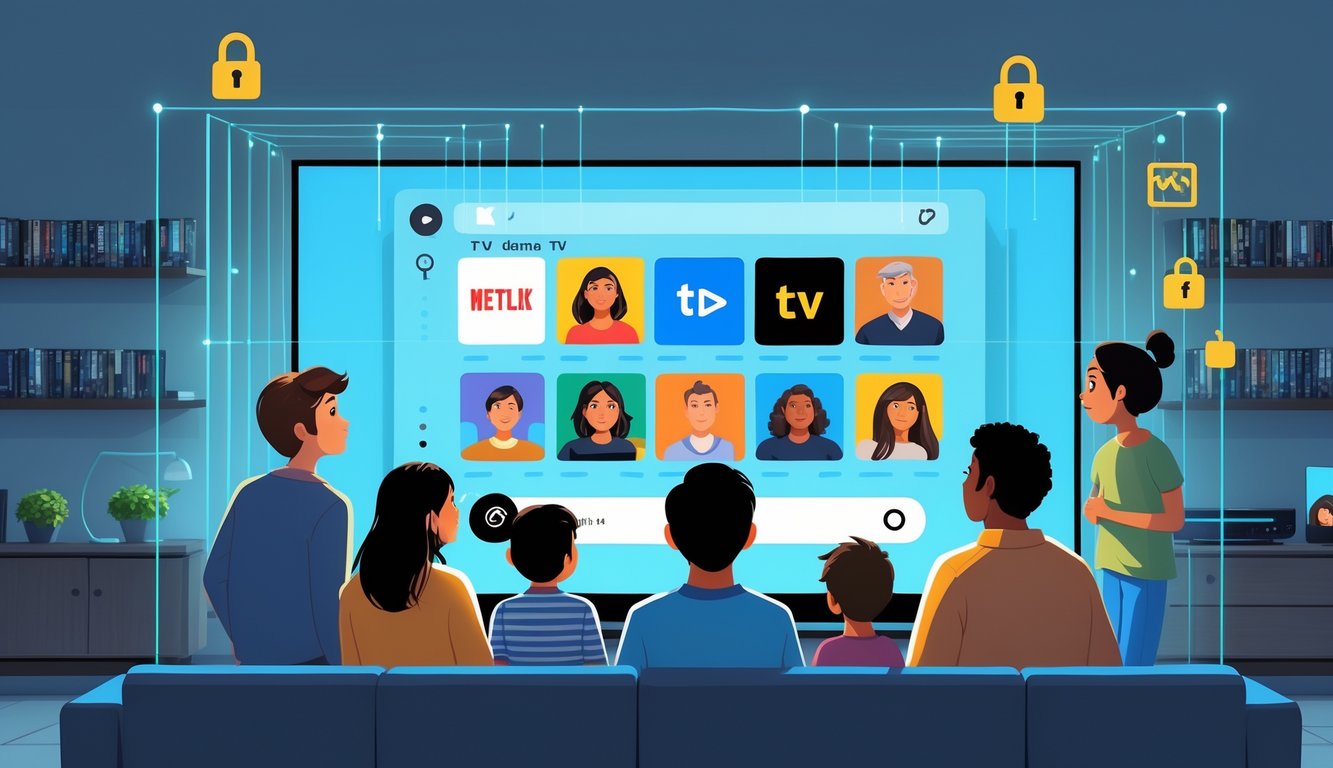
Account Sharing Policies
Remember when sharing your password was just… normal? Not anymore. Netflix rolled out the “extra member” fee and now I get device checkups after every holiday. Simple, right? Until your cousin at college can’t log in and starts texting you in all caps.
Platforms use device-location checks, spammy “Was this you?” emails, and Netflix’s lovely 15-minute verification codes. Bottom line: stop freeloading, buy your own. Statista said 42% of people quit sharing in 2023—either because of policy or just too many warnings. Amazon Prime Video lets you set up “household profiles,” but it’s all fuzzy math. Hulu cares about your “home network,” which got me stuck for weeks after my router died.
Device and Simultaneous Streams
Never thought owning a smart TV, a couple tablets, and a laptop would turn into a streaming turf war. HBO Max boots me if someone else starts watching in the living room. Netflix Standard as of June 2025? Three screens, max. Disney+ lets you have four. None of it’s enough if you have kids or roommates.
Apple TV+ doesn’t even say how many is too many, it just quietly logs you out. Hulu’s “Live TV” plan claims unlimited screens—if you pay extra. And logging out on one device doesn’t always free up a slot. I called support at 7 a.m. once, and they told me to “wait up to 8 hours” for the stream limit to reset. That’s not exactly binge-friendly.
Data Caps and Video Quality
And then there’s the data cap circus. AT&T says “unlimited” but starts throttling after 25GB, so your crisp 4K turns into a pixelated mess. Comcast’s 1.2TB cap is real—4K movies eat that alive (seriously, 50GB gone in a weekend). Netflix and YouTube just drop your resolution if your speed dips or you’re on mobile data. No warning, just blurry faces.
FCC said in 2023 that streaming eats up more than 75% of peak internet traffic in U.S. homes, and mobile providers usually default to 480p to “help” you avoid overages. Want HD? Dig through account settings. Why don’t they tell you any of this up front? Maybe some people still think 480p looks fine, but I’m not buying it.
Licensing and Distribution Agreements

Here’s the sneaky part: licensing. Nobody thinks about it, but it’s the reason shows vanish or randomly pop up on platforms you’ve never heard of. Studios chop up rights, set time limits, split countries, and suddenly your favorite movie isn’t even legally allowed to stream where you live. Who decided this was normal?
International Licensing
Every time I travel, I try to stream something and—nope, region-locked. No warning, just a dead end. Licensing contracts don’t care about viewers; they’re cooked up deal by deal, country by country. Digital TV Research (2024) says over 65% of top movies aren’t available in both the U.S. and Europe. HBO’s “Succession” streams on Sky Atlantic in the UK, but only on Max in the U.S. Same show, different contracts, zero logic.
A lawyer friend once told me, “Geo-restriction is baked into every deal—servers have to enforce it or risk penalties.” VPNs work until they don’t. It’s chaos: Hollywood hits, K-dramas, anime—every genre gets sliced up into a million micro-agreements. It’s all legalese, not common sense.
Show and Movie Rotation
And then, stuff just disappears. One day your favorite movie’s there, next day it’s gone. Streaming libraries rotate titles for “freshness,” but let’s be real, it’s almost always about expiring licenses. Netflix says outright they “lose rights to titles over time,” which usually means a studio wants more money or didn’t renew. That’s not a feature, that’s just business.
A former Netflix acquisitions guy told me they schedule most removals months ahead, but last-minute legal drama or bidding wars can kill a title overnight. It’s all managed by procurement teams, not algorithms, not user feedback. I’ve canceled plans to binge a show only to find it vanished with zero notice. Nobody ever says who pulled the plug.
Exclusive Content Deals
Oh, and exclusives. “Only on Disney+!”—which just means I need yet another subscription for my Marvel fix. Studios love this. Paramount+ hoards “Star Trek,” Apple TV+ grabs “Ted Lasso,” Amazon dumps billions into “The Boys.” Legal teams engineer these exclusives for bragging rights and, yeah, subscriber numbers.
An entertainment lawyer once told me, “The real power is in withholding, not sharing.” But exclusives barely last—shows bounce to free TV years later, confusing anyone who remembers when it was “only on” something. We’re just pawns in a contract shuffle nobody sees. No schedule, no transparency, just a bunch of deals. Is anything really exclusive, or is it just a never-ending promo? My calendar’s given up.
Major Streaming Services and Their Policies
Honestly, I’m still baffled by how streaming rules keep mutating—one minute you’re watching your favorite series, next minute it’s just gone. Regional blocks? Arbitrary device limits? And don’t even get me started on that panicky rush to finish a show before it disappears. I swear, I spend more time trying to remember which app hosts what than actually watching anything. Account sharing, rotating titles, all the “fine print”—it’s like they’re actively trying to make me feel dumb.
Netflix’s Access Model
Netflix. You’d think by now they’d settle on a system, but nope—every time I blink, something’s different. I lose track of what’s in my queue, and apparently Stranger Things just up and vanished from my feed last July, even though my cousin in Toronto still had it. Licensing “windows,” they call it? Whatever. All I know is, shows appear and disappear with zero warning, and it’s not like they ever explain why.
The password crackdown? Ugh. Reddit exploded. Netflix now ties profiles to your home Wi-Fi IP, at least in Australia and the US—so if you’re traveling, or your friend in another city logs in, suddenly you’re locked out. I read somewhere (2023 earnings call?) that over 100 million accounts had been sharing before this. The “add a household” upcharge? Not worth it, especially since the app still boots me mid-episode if I’m on hotel Wi-Fi. (Lost my place in a documentary at LAX, thanks for nothing.)
And don’t fall for the “global library” myth. Pay for premium, basic, whatever—your options depend on where you are, and sometimes “just added” means “old thing shuffled in because the new stuff is gone.” The randomness is wild. Why do I keep paying for this? I honestly don’t know.



